No Ruined Stone
by Shara McCallum
Review by Sarah Van Clef
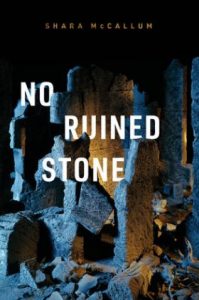
To read the review of No Ruined Stone by Sarah Van Clef, click HERE.
Philadelphia Stories: Publishing Local Writers & Artists

To read the review of No Ruined Stone by Sarah Van Clef, click HERE.
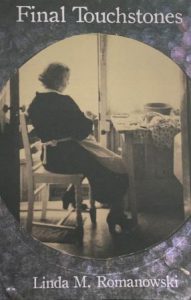
To read the review of Final Touchstones by Linda Romanowski, click HERE.
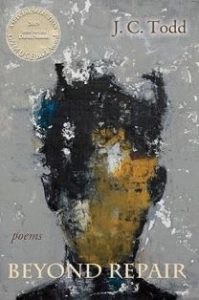
Beyond Repair presents a solemn, resigned perspective of war and its inevitable, irrevocable toll on civilians, combatants, and their communities. The collection opens with “In Whom the Dying Does Not End,” in which a parent recalls the development of her child’s body inside of her. This intense awareness of the work of creating a body – the prolonged and exact process of gestation – follows through the book as a counter-perspective to the awareness of the body’s vulnerability to violence and how witnessing such violence can affect the brain. The speaker in “In Whom…” contextualizes her daughter’s gestation within her own awareness of an insurgency in Hama, Syria. Throughout this collection, that balance between human creation and destruction reinforces the shared humanity of us and them in any conflict, across any border, but maintains that geography, history, power, and imperialism have made some bodies more vulnerable than others.
As it establishes expectations about pregnancy and motherhood, “In Whom the Dying Does Not End” offers a lens to see the effects of war on parents, children, and the bond between parents and children. Other poems such as “Cover Shot” (13) and “Night Ride, ar Raqqah” (17), pick up the theme of caring for children or carrying a pregnancy through tragedy. These poems seem to attempt to balance threat and promise. By referring to the space inhabited by her daughter as the “province of my body” (4), this foundational idea of pregnancy and development becomes complicated with the idea of nations and political powers within them. The speaker of “In Whom…” is “consumed by what I feed,” reflecting the parasitic nature of imperialism. The poem’s depiction of violence in Hama is countered by the daughter’s development: “a riot of cells / firing between [hips]” (3). Different “provinces” support or suppress different revolutions. The poem “Flashback to the Morning After” makes this parasitism even more explicit in depicting the flies in the wounds of a child: “…his decay / is the incubator / and holy food for clusters / of eggs” (44). Such a “contagion” is “alien / and intimate / as a just-conceived child.”
“My Parents’ Altruism” also repeats themes of “In Whom the Dying Does Not End” such as gestation and development of life set against a backdrop of war. The poem suggests an animal urge toward growth and survival and future. The repeated emphasis on the scientific and medical language serves to de-personalize the images and allows the poems to speak to universal human experiences. Todd writes, “Eight months before birth, / all the eggs I will bear into life / appear in me as seed” (51): not only is there birth emerging out of war, “the seedbed” where the speaker has “taken root,” but the potential for the next generations.
The landscape is another vulnerable body threatened by human violence. The former fecundity and abundance of “Peshawar Lahore Kashmir Shalimar” are mourned in the poem, “The Silk Road and the Scythe.” Here, an orchard, provides an image of historical opulence and plenty “epic and sugary before it fell” by the work of “that ascetic—the scythe” (9); such destruction of orchards and farmland leads to the starvation of human bodies. Similarly, in the section “Earth” from the sequence “The Damages of Morning,” the planet itself says of its unruly inhabitants, “They cavort and die. I persist, / My motion not a quest for power / Or longevity” (75). The host can withstand cycles of destruction and regeneration to a degree we squabbling leeches, fleas, and flies cannot.
The title Beyond Repair comes from the military slang term FUBAR, an acronym meaning “fucked up beyond all repair.” Here, “FUBAR’d” is a sonnet sequence near the middle of the collection about an Air Force doctor who is coping with immense and relentless loss: of patients, community, resources, and of elements of herself. The sequence brilliantly uses the sonnet form to contain ideas and emotions that are too gruesome or too dangerous to share unfettered. The connections among the linking first and last lines of the sequence stitch together like sutures, holding together this doctor’s world, but just barely: “…In dreams, their skin gapes open / to wound her pain that has no analgesic” (31) shifts into “Too wound up and there’s no analgesic / strong enough to bring her down but uproar” (32). I think of the splint, tourniquet or the hasty stitches closing a wound enough to protect the patient for just a little longer. The subject of these poems considers how changed she is, how unrecognizable to those with whom she shares a life: “Best prepare him to live with her half-gone, / fucked up by damage beyond her control” (34).
Partway through the book, Todd’s geography becomes more familiar to American readers: in “Imagining Peace, August: 1945,” we see the speaker’s father and uncles “laze in Adirondack chairs” while drinking beer and singing “Mairzy Doats.” The poem presents a family’s exhalation after the end of war, and the ways that confrontations persist in peace: “We’re picking fights. Clam up / or else, the first idle threat of peacetime” (54). Poems in this section relate to the poet’s childhood and growing up and how life is shaped by WWII, Korea, Vietnam. Even in American backyards, insulated against so much of the terror experienced elsewhere, we feel reverberations. For many U.S. citizens living today, there are few periods of time untouched by American militarism; very few of us know no veterans or refugees of these and other wars. In “Reading the Dark in the Dark” (58) and “Reading with Students about Death Camps” (69), Todd illustrates the ways these stories of war are shared through writing and reading as well as through more personal and immediate connections.
War, militarism, and imperialism affect all of us – the relative immediacy of that danger may vary whether we are living in a region under siege, working in such a region, or growing up with someone who has witnessed such horror. Todd’s emphasis on the body allows us to consider all bodies regardless of political or ethnic identity. Removed from borders and beliefs, the physical body that demanded the sacrifice of parents’ strength, time, and safety is a body familiar to most of us. The human connection shared among parents and children across languages, regions, and cultures is matched by our shared vulnerability to violence. Todd knows that it is often easy to look away, but Beyond Repair presents layers upon layers of damage – a reader will almost certainly recognize a familiar reflection in at least one of these stories. Maybe the title is more a question than a declaration. How much suffering and how much cruelty will push us “beyond all repair/recognition/reason/redemption” (Notes 91).
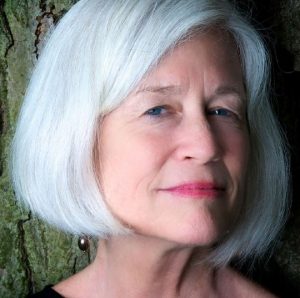
J.C. Todd is the author of Beyond Repair, a special selection for the 2019 Able Muse Press Book Award. Other books of poetry are The Damages of Morning (Moonstone Press 2018), a 2019 Eric Hoffer Award finalist, What Space This Body (Wind 2008), the chapbooks Nightshade and Entering Pisces (Pine Press 1995, 1985), and collaborative artist books from Lucia Press, On Foot/By Hand and FUBAR, both in the collection of the Library and Research Center of the National Museum of Women in the Arts. Honors include the 2016 Rita Dove Poetry Prize and finalist designations for the Robert H. Winner (2015) and the Lucille Medwick (2006) awards of the Poetry Society of America. She has received fellowships from The Pew Center for Arts and Heritage, Pennsylvania Council on the Arts, and awards from the Leeway Foundation and the Latvian Cultural Capital Fund, and has been a fellow of the Bemis Center, Hambidge Center, Ragdale, Ucross, and Virginia Center for the Creative Arts international artist exchange program, as well as a scholar at the Baltic Center for Writers and Translators and a resident poet at the Experimental Printmaking Institute, Lafayette College. Her poems have appeared in Baltimore Review, Beloit Poetry Journal, Mezzo Cammin, The Paris Review, Prairie Schooner, Virginia Quarterly Review and other journals, and have been anthologized nationally and internationally, most recently in Welcome to the Resistance (Stockton University Press), Fire and Rain: Ecopoetry of California (Scarlet Tanager Press), and A Constellation of Kisses (Terrapin Books).Her poetry has been translated into Lithuanian, Italian, and Albanian. She has edited two online anthologies for the former journal, The Drunken Boat: Contemporary Lithuanian Poetry in Translation (Winter 2002)and, with coeditor Margita Galaitis, “To Be The Roots:” Contemporary Latvian Poetry in Translation (Winter 2005). She has lectured on lineages in American women’s poetry at Vilnius University in Lithuania, the University of Latvia in Riga, and, through the American Consulate in Berlin, at the American Studies Departments of Goethe University in Frankfurt and the Universities of Bayreuth, Stuttgart, and Würzberg. Currently she is writing a group of poems responding to the work and life of the German Expressionist artist Käthe Kollwitz, which has been supported in part by a residency with the Department of English Language and Literatures at Humboldt University, Berlin. For her work in Artists in the Schools programs, Todd has received a Governor’s Award for Arts Education and a Distinguished Teaching Artist Award from the state of New Jersey and a fellowship from the Mid-Atlantic Arts Council. She is affiliated with the Geraldine R. Dodge Poetry Program and Festival, where she has been a featured reader and workshop facilitator. She has taught on the faculties of the Creative Writing Program at Bryn Mawr College and the Rosemont MFA Program and holds an MFA from the Program for Writers at Warren Wilson College. She lives in Philadelphia, Pennsylvania.
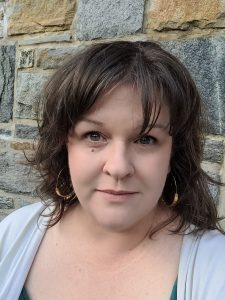
Courtney Bambrick is poetry editor at Philadelphia Stories. Her poems are in or forthcoming in Inkwell, Invisible City, New York Quarterly, Beyond Words, The Fanzine, Philadelphia Poets, Apiary, Schuylkill Valley Journal, Mad Poets Review, Certain Circuits. She teaches writing at Thomas Jefferson University’s East Falls campus in Philadelphia.
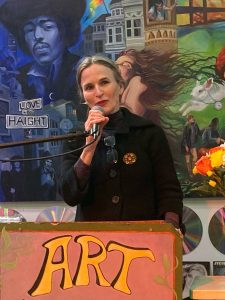
Don’t rhyme “June” with “spoon,”
unless maybe it’s one
that’s bent back & tarred black,
nor “moon” with “June”
unless you mean the bug big
as a car now battering my screen.
“Soon” also is suspect.
Expect it to be the same
as when pairing “breath”
with “death” in a previous line–
the poem had better
have depth in infinite fathom
& the rhyme, at least
one reason for being
besides the chime. Time is not
on your side, friend.
The end is too near to waste
even one unstressed beat
on a repeat of anything.
Yes, it will take some work.
Wait, do I hear you complain?
So you impressed yourself
slant-rhyming “duende”
with “pudendum,” but look—
already been done
& more than one time. Ditto
for subbing in “dog”
for its reverse rhyme, “God.”
It’s true both are dead
so far as I know, but—never mind.
The point not to repeat
a tired trope. The point is to hope
things will be better or different
—at least try to make language new—
I triple-God dare you.
Rebecca Foust’s seventh book, ONLY (Four Way Books 2022) earned a starred review in Publishers Weekly and was featured on the Academy of American Poets 2022 Fall Books List. Her poems, published widely in journals including The Common, Narrative, POETRY, Ploughshares, and Southern Review, won the 2023 New Ohio Review prize and were runner-up for the 2022 Missouri Review Editors Prize.
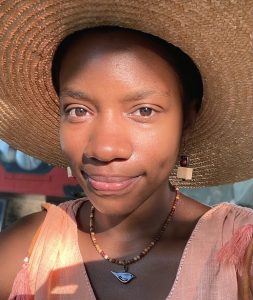
Crows & their eyes’ starry glint,
brassy anklets of sparrows, ruby-crowned kinglets:
among these trees all limb & lung, each is a jewel
churning hours, draping Earth in necklaces of song
that rain onto my bed of ringlets
black as crows & their starry glint.
My dark volunteers decide where they belong.
Abiding by the current of these glossy rivulets,
I shrug at the slim rings crowning my head, fussy jewels
I swear stand on end when the crows arrive each dawn.
Breezing from the trees (those gem cabinets)
the crows nearly appear to wink—that starry, starry glint.
I toss them some peanuts on the roof and lawn,
willing our adjacent lives to better bisect,
hoping they’ve glimpsed in this gesture a jewel
of goodness. The human shock of my face gone
softer, daily, till in beaks of black intellect
the crows carry a kinship with my own starry glint.
All limb & lung, wing & song, each of us: jewels.
Basia Wilson is a poet with a BA in English from Temple University. A finalist for the 2022 Banyan Poetry Prize, Basia’s work has most recently been published in Voicemail Poems and bedfellows magazine. Selected for Moving Words 2023, her work will soon be adapted for animation in an international collaboration between writers, animators and filmmakers with ARTS By The People.
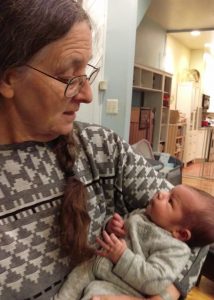
Take the afternoon train toward
forgetting.
Fill the saddlebags of your Harley.
Go in peace.
I will wait under the birch
for the owls to cry.
Hitchhike to Columbus.
Carry a calico bandana full of lightning.
I will remember the hedgerow,
the small silver trout,
the history of icicles,
the taste of juniper berries on your tongue.
Pack your trunk, take your pistol,
Measure the wingspan of a barnwood flag.
I carry a snail in my backpack.
He chases a grasshopper
under stones.
Heartsick, your highway
whispers ‘tomorrow, heart,
ache’. This is a film,
twice forgotten:
a spaghetti western,
this balloon lifting
you from sleep.
Pediatrician Kelley White has worked in inner-city Philadelphia and rural New Hampshire. Her poems have appeared in Exquisite Corpse, Rattle and JAMA. Her most recent chapbook is A Field Guide to Northern Tattoos (Main Street Rag Press.) She received a 2008 Pennsylvania Council on the Arts grant and is currently Poet in Residence at Drexel University College of Medicine. Her newest collection, NO.HOPE STREET has just been published by Kelsay Books.
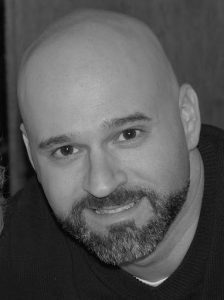
On a winding road this side of South Mountain
which looms beside the less and less quiet valley,
we park the Jeep just past a roadside spring
that streams from a pipe fastened to a rock.
Such an insufficient description, I know,
but you don’t need to see it, just trust
that today as we lift empty plastic jugs from the back
and pop the caps to fill up on the free spring,
I’m stuck in time, or maybe just seemingly so
because nothing passes—not a car, a bike, or a breeze,
not a sound from the songbird likely stuck somewhere
deep in the somewhere trees erectly still on the mountain.
I’m bound by the thought of us here, somewhere
in the muck of life and all that’s falling
each day—each leaf, each dripping drop, each glimpse
of sunlight reflecting from the cascade of uncertain endings.
Someday I’ll ask where this went, where it fell or what it
fell into. But if I stay here, stuck, just one moment more,
I know I’ll find a way to slip this into my pocket,
zip us up, cap these jugs, preserve the roadside spring
that begs us to drink—drink from this leaky mountain,
as if we seek the answers or even know how to ask.
Wes Ward was born in Dover, Delaware, though roots tie him back to Chester County, Pennsylvania, where his dad was raised. Now a familiar stranger to Philadelphia, Wes lives a couple hours due West of Independence Hall and teaches high school English and college writing. He earned his Master’s of Arts in Writing from Johns Hopkins University.
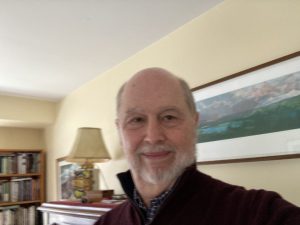
To my mother, Elizabeth Worthington Shelly
A coarse scatter of gravelly buds
with a bare wire undercarriage,
a stem like baling twine,
and the aroma of last night’s dowsed fire.
No silky petals here:
you look like the doilies old ladies lay
on the heads and arms of chairs
to soak up sweat and body oil.
How cruel, they named you for a queen
when you were always a working class flower,
a Depression bloom.
There was never any luxury for you:
nobody took you into their garden
to cultivate or to coax.
You grew up in worn out fields,
in ditches along the sides of roads,
nurtured on rocks and exhaust fumes.
And that one purple dot in your center?
The one legend says is lacemaker’s blood?
That’s yours: shed along with your last tear
before you learned never to cry again
no matter how much it hurt.
Steve Shelly lives in Devon, Pa. and has worked for many years as a psychotherapist. His poetry has appeared in a variety of publications including The Atlanta Review and Philadelphia Stories. He works as a Volunteer Guide at the Philadelphia Museum of Art.
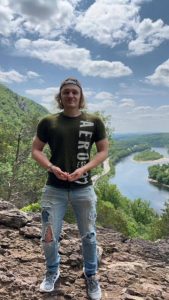
To view “Bic Breath,” by Jake Price, click HERE.
Jake Price is a sophomore student at Susquehanna University pursuing a degree in creative writing. He spends most of his time reading his work to his cat, Raven, who has yet to give him any feedback. Jake has an Instagram account where he posts his poetry, @nolenprice, that has amassed over 3100 followers as of writing this. His poetry has been published in Rivercraft Magazine, Poet Lore Magazine, and Sanctuary Magazine. His short fiction has also been published in Cream Scene Carnival and Querencia Press.

I don’t want to start with the moon
but it was gloomy outside
and there was a pale quivering light
that reflected from water
and silvered the tips of branches
leaving me little choice
even as I contemplated again
the traumatizing prospect of aging
even as I stood there on the renovated deck
considering whether to walk the avenues
in order to clear my head
or to return to my laptop
with all of the tasks that I was avoiding
and as I continued to kill time
and waste psychic energy
you appeared backlit in the doorway
and as I watched you
the flames licked up from the bottom
of your dress and burned it away
your arms raising and fire leaping the gap to me
and I was lost inside moonlight
inside unbreathable heat
I still remember that night after all this time
I still bear the scars
of that unexpected conflagration.
Paul Ilechko is British American poet and occasional songwriter who lives with his partner in Lambertville, NJ. His work has appeared in many journals, including The Night Heron Barks, Tampa Review, Iron Horse Literary Review, Sleet Magazine, and The Inflectionist Review. He has also published several chapbooks.